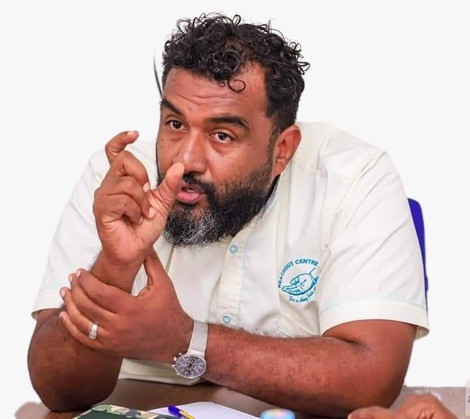
In the bustling streets of Mombasa, where the Indian Ocean breeze carries both hope and hardship, one man stands out in a quiet revolution. Taib Abdulrahman, Reachout Centre Trust (RCT) Executive Director, has dedicated over two decades to championing the rights of people battling drug addiction—a marginalised group often pushed to the edges of society, proving that compassion and care can transform lives.
For Taib, rehabilitation is not just about treatment; it is about restoring dignity, protecting health, and ensuring that even the most stigmatised members of society are not forgotten.
One of Taib’s proudest achievements is the healthcare clinic established at RCT in 2015—designed for people struggling with addiction. “Drug users, like any other person, need a safe space to express themselves freely,” he explains.
For Naima said, a recovering addict who spent over ten years in the grip of heroin, the clinic became her turning point. “What you see on the outside is drug addiction and self-loathing,” she recalls. “But inside, you’re a mother, a daughter, a sister… When it works, it’s magical,”
Advocacy
Taib’s work began with a simple but radical belief: that drug addiction is a disease—not a moral failure—and that those who suffer from it deserve compassion, treatment, and a chance to recollect and rebuild their lives a belief that became the cornerstone of RCT, which was established in 2003 to provide rehabilitation, harm reduction, and social reintegration in Mombasa Kwale and Taita taveta counties.
Taib’s path to human rights work began with a simple but profound conviction—that drug addiction is a disease, not a moral failure. “Drug addicts are scorned by society, yet they are sick and need help,” he says. “They have gone to the extent of advocating their removal… but where will they go?”
[Reachout Centre Trust Executive Director, anti-drug Czar and community activist Taib Abdulrahman helping out drug users right at their dens in Mombasa. Photo/Joseph Ngala/August, 21, 2025].
Over the years, Taib has transformed the organisation from a modest outreach initiative into one of Kenya’s leading anti-drug lobbies—pioneering holistic approaches to addiction treatment, maternal health care, and economic empowerment.
Restoring Dignity
The clinic provides specialised care for women struggling with substance use—offering a range of services among them, HIV testing, hepatitis screening, mental health support, and reproductive health care.
This clinic is more than a health facility—it is a sanctuary,” Taib says, emphasizing the importance of treating patients with empathy rather than judgment.
The clinic has since served over 200 women, helping them deliver healthy babies and begin new journeys toward recovery.
Battling stigma, changing perceptions
In a society where drug users are often branded as criminals, Taib has worked tirelessly to shift public perception. Through media campaigns, community dialogues, and awareness events such as the “Support, Don’t Punish” initiative, he underscores a simple but powerful message: addiction is a medical condition, and those affected deserve treatment—not punishment.
This approach has inspired policymakers, parents, and young people to rethink their attitudes toward addiction—turning stigma into support.
Innovation amid crisis
The COVID-19 pandemic presented an unprecedented challenge. With movement restrictions and lockdowns threatening to disrupt rehabilitation programs, Taib and the entire RCT team devised an innovative solution: satellite methadone dispensing centers in Likoni, Majengo, and Frere Town. These facilities ensured that clients received continuous care, even at the height of the crisis, protecting them from relapse and related health risks.
Economic Reintegration
Rehabilitation alone is not enough. Taib understands that without economic empowerment, many recovering addicts face the risk of falling back into destructive habits. That is why RCT runs a halfway house in Shelly Beach, where clients learn skills like beauty therapy, poultry farming, vegetable growing, and entrepreneurship.
These programs provide more than income—they restore hope and self-worth, giving clients the tools to start afresh.
But Taib’s advocacy has not been without risk. As an outspoken critic of drug cartels and their enablers, he has faced threats and intimidation—proof of the powerful forces that stand against change. Yet, despite the dangers, he remains steadfast, insisting that the fight against addiction is not only a public health battle but also a human rights struggle.
Visionary leader
As RCT continues to expand its reach, Taib envisions a future where addiction services are accessible in every county, stigma is eliminated, and people recovering from substance use are fully reintegrated into society. His dream is simple but profound: a Kenya where no one is defined by their lowest moment, and every person is given the dignity of a second chance.
Taib Abdulrahman may not be a household name, but his impact is undeniable. Through quiet determination, compassion, and courage, he has helped rewrite the story of drug rehabilitation in Kenya’s coastal region. In a world quick to judge and slow to forgive, Taib stands as a reminder that true heroism lies not in the spotlight, but in the relentless pursuit of dignity for those most often forgotten.
“I used to stay in the drug den with my children, now I’m a peer educator with Reachout, I have dedicated myself to helping others so that they do not plunge into drug addiction,” said one of RCT beneficiaries Susan Wambui, who described her painful but resilient recovery journey.
[Healthcare worker provides health assessment and services during an outreach activity in Mombasa. Photo/Joseph Ngala/August, 21, 2025].
“We are seen as thieves or criminals, but that is not the truth. We are asking the society to bring us close to them because we need empathy,” Debora Ebole, a former addict of twenty years, Debora Ebole expressed relief.
Taib Abdulrahman may not seek the limelight, but his work shines brightly in the lives he has touched.